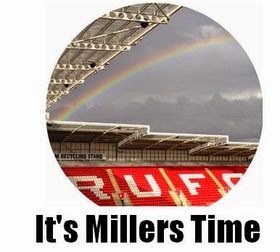For every
Nigel Jemson and Alex Revell, there is a Gary Bowyer.
Wembley only tends to remember winners and that’s why Jemson, with his brace in the 1996 Auto Windscreens Shield win and Revell, with his ambition and brilliance in 2014 etched their name into Rotherham United folklore following their heroics at the national stadium.
Wembley only tends to remember winners and that’s why Jemson, with his brace in the 1996 Auto Windscreens Shield win and Revell, with his ambition and brilliance in 2014 etched their name into Rotherham United folklore following their heroics at the national stadium.
It rarely
remembers losers, indeed, even Ryan Taylor’s two-goal salvo in the 2009-10
League Two play-off final cannot sustain itself in the memory alongside the truly
great moments in the club’s history.
Look up
the word bittersweet in the dictionary and there is likely to be a picture of
the Scot next to its definition.
Bowyer
was part of that 1996 squad that created history by becoming the
first Millers squad to play – and win – at Wembley.
The victory over Shrewsbury Town was the culmination
of a superb run in the competition, in which Bowyer more than played his part, with
the Area Final second-leg win over Carlisle United often spoke about as one of
the great away days in the club's history.
The glory
at Wembley, in front of almost 25,000 fans from Rotherham ,
was sealed by Jemson’s two goals and led to scenes that go down in history.
That was
the sweet part for Bowyer.
The
bitter part – he was left out of the side by joint-managers Archie Gemmill and
John McGovern and was an unused substitute, something that no matter what brave face is put on it, must overshadow the day slightly.
But to
his credit, there was no sulking from the former full-back and he put his obvious
disappointment to one side.
“Unfortunately
for myself I got left out on the day which wasn't very good from a personal
point of view," he said.
“Everybody
wants to play but the managers at the time made the decision that I didn't play
so that was that.
“You just
have to quickly accept it and get around the ones that were playing.
"I remember
going straight up to Paul Hurst, who had taken my place, and wished him all the
best and then at the end of the game I congratulated him because it was a team
effort.
“I had
played my part in getting us there and I was really delighted to go as winners.
“It was
great to go there and be a winner at Wembley. It's a special place - and to go
and win is a fantastic achievement.
“I can
remember the Rotherham fans came out in their
thousands, it was brilliant to see in terms of the level of their support. It
was a great day out for them and fortunately we helped that.”
Unfortunately,
things did not get much better for Bowyer, or the club, after the Wembley win
and both endured horror seasons in 1996/97.
Bowyer
suffered a career-ending back injury while the Millers went through arguably
their worst-ever campaign which resulted in relegation to the fourth tier
following the appointment of the eccentric manager Danny Bergara – who later
claimed to be the trailblazer in allowing English clubs to appoint foreign
managers.
Bergara
resided over some of the darkest times at Millmoor, but Bowyer insists the
Uruguayan, who passed away in 2007 aged 65, wasn’t all bad.
“I can remember the first day he
(Bergara) came in and he got introduced as the new manager and he started
speaking in Spanish,” he added.
“He
addressed us in Spanish for a couple of minutes and we all kind of thought, 'Oh
my god - we might have a problem here!'
"But
he was a good bloke; he was very, very passionate about football and would talk
football all day long. I loved listening to him.”
When
Bowyer exited Millmoor in 1997, just prior to Ronnie Moore’s arrival, it would
have been unthinkable for the club to be where it is now, playing in the second
tier in a fantastic new stadium.
Steve
Evans led this particular rise, following in the footsteps of Moore
"When
I left, the club had just got relegated and attendances had dropped," he
added.
"But
you always knew that there was support there for the club, as was proved when
we went to Wembley.
"But
the turnaround of the club over the last couple of years has been nothing short
of magnificent.
"The stadium is an unbelievable
stadium.
“There's no slope on the pitch like
there was at Millmoor like when we used to play. That makes it easier for the
players because they don't have to run uphill!”


